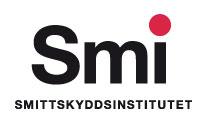SWEDISH SOUTH ASIAN STUDIES NETWORK
Department of Bacteriology, Swedish Institute for Infectious Disease Control, Stockholm
 Postal address: Smittskyddsinstitutet (SMI), SE-171 82 Solna, Sweden
Postal address: Smittskyddsinstitutet (SMI), SE-171 82 Solna, Sweden
Visiting address: Nobels väg 18, Solna
Web page: http://www.smittskyddsinstitutet.se/in-english/about-smi/departments-and-units/department-of-bacteriology/
Contact person: Professor Stefan B. Svensson
The task of the Department of Bacteriology is clinical bacteriology with the focus on the notifiable diseases, according to the Swedish Communicable Disease Act. In collaboration with the Department of Epidemiology, the Department follows the epidemiological situation and develops new diagnostic methods. The spread of antibiotic resistance and nosocomial infections are under observation, as are other factors of importance for the spread of bacterial diseases. The Department actively takes part in international harmonization of methods, is a WHO collaborating centre for legionnaires disease, and collaborates nationally and internationally with other microbiology laboratories.
A high level delegation from India visited Sweden 18–20 May 2011 to participate in the Joint Working Group (JWG) meeting set-up under the Memorandum of Understanding (MoU) on cooperation in the field of Health Care and Public Health between the Government of India and Sweden. During the visit a Memorandum of Intent was signed between the National Centre for Disease Control (NCDC) India and Smittskyddsinstitutet to increase cooperation in the field of antibiotic resistance and its rational use. The contact person on the Swedish side are SMI Director General Johan Carlson, and Project Manager Viveca Urvitz.![]()
Research related to South Asia:
Prof. Stefan B. Svensson is involved in research on tuberculosis in Third world countries. In November 2007, Prof. Svensson received SEK 1 million as a two years grant (2008-09) from Sida's
Developing Country Research Council (U-landsforskningsrådet) for a comparative project titled ”Research on the Utility of new Tests for rapid Diagnosis of
Tuberculosis”. More information about the 2007 Sida grants.
The project has been a comparative study between Latin America (Peru) and South Asia (Nepal).
SASNET - Swedish South Asian Studies Network/Lund
University
Address: Scheelevägen 15 D, SE-223 70 Lund, Sweden
Phone: +46 46 222 73 40
Webmaster: Lars Eklund
Last updated
2011-09-01
